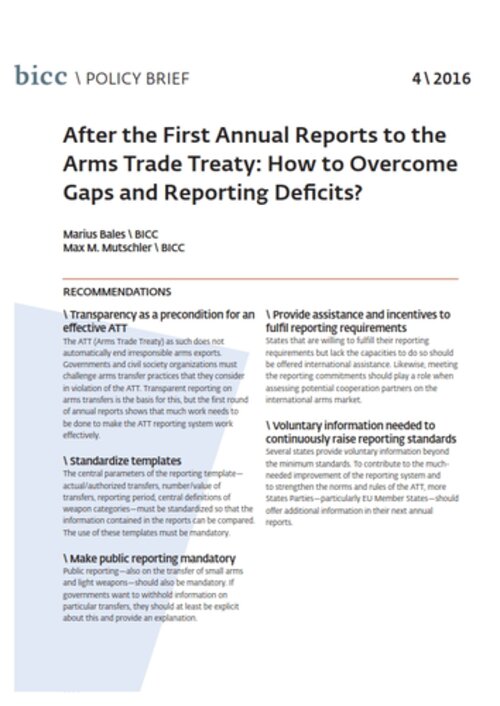Publications
After the first annual reports to the Arms Trade Treaty: How to overcome gaps and reporting deficits?
Release Date
2016-10
Language
- English
Topics
- –
An analysis of the first round of annual reports reveals considerable gaps and reporting deficits; in particular with regard to the number of reports delivered on time, the concealment of information, missing transfers, the comparability and the level of detail in the reports. These deficits are in part due to states’ unwillingness to disclose information on their arms transfers, but there are also several problems that are inherent to the existing reporting system. Unfortunately, States Parties did not make much progress in overcoming these problems at the CSP2.
In BICC Policy Brief 4 \ 2016 “After the First Annual Reports to the Arms Trade Treaty: How to Overcome Gaps and Reporting Deficits?” the authors in particular recommend:
\ Transparency as a precondition for an effective ATT
The ATT as such does not automatically end irresponsible arms exports. Governments and civil society organizations must challenge arms transfer practices that they consider in violation of the ATT. Transparent reporting on arms transfers is the basis for this, but the first round of annual reports shows that much work needs to be done to make the ATT reporting system work effectively.
\ Standardized templates
The central parameters of the reporting template—actual/authorized transfers, number/value of transfers, reporting period, central definitions of weapon categories—must be standardized so that the information contained in the reports can be compared. The use of these templates must be mandatory.
\ Make public reporting mandatory
Public reporting—also on the transfer of small arms and light weapons—should also be mandatory. If governments want to withhold information on particular transfers, they should at least be explicit about this and provide an explanation.
\ Provide assistance and incentives to fulfil reporting requirements
States that are willing to fulfill their reporting requirements but lack the capacities to do so should be offered international assistance. Likewise, meeting the reporting commitments should play a role when assessing potential cooperation partners on the international arms market.
\ Provide voluntary information to continuously raise reporting standards
Several states provide voluntary information beyond the minimum standards. To contribute to the much-needed improvement of the reporting system and to strengthen the norms and rules of the ATT, more States Parties—particularly EU Member States—should offer additional information in their next annual reports.
PDF-Download
bicc_policy_brief_4_2016.pdf
[English] (215.72 KB)

Cite as
@techreport{BalesMutschler2016,
author = "Marius Bales and Max Mutschler",
title = "After the first annual reports to the Arms Trade Treaty: How to overcome gaps and reporting deficits?",
latexTitle = "After the first annual reports to the Arms Trade Treaty: How to overcome gaps and reporting deficits?",
publisher = "bicc",
number = "4",
institution = "bicc",
type = "BICC Policy brief",
year = "2016",
address = "Bonn",
}
Document-Type
BICC Policy brief
Publisher
bicc
Place
Bonn



